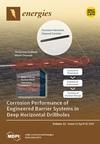地方能源社区支持氢气生产和网络灵活性
IF 3
4区 工程技术
Q3 ENERGY & FUELS
引用次数: 0
摘要
本文探讨了可再生能源社区资源的优化调度问题,其协调的目的是为配电网络提供灵活性服务。可用资源包括可再生能源发电装置、电池储能系统、可调度负载和电力制氢系统。拟议战略的主要目的是加强本地资源的自我消费和氢气生产,并最大限度地提高氢气销售和社区共享能源补贴所带来的经济效益。所提出的方法是一个经济问题,既考虑到社区成员的观点,也考虑到配电系统运营商的观点。更详细地说,这是一个混合整数约束的非线性优化问题。考虑了与电网资源和电力流相关的技术约束。通过数值应用可以验证程序的有效性。结果表明,在通过利用社区资源提供有功和无功功率支持的灵活性服务的同时,有可能增加自我消费和绿色氢气的生产。更具体地说,将建议的策略应用于不同的案例研究表明,每安装 1 兆瓦可再生能源发电设备,每天可获得高达 1000 欧元的收入。这一价值包括通过提供灵活性服务获得的收益,约占总收益的 58%。本文章由计算机程序翻译,如有差异,请以英文原文为准。
Local Energy Community to Support Hydrogen Production and Network Flexibility
This paper deals with the optimal scheduling of the resources of a renewable energy community, whose coordination is aimed at providing flexibility services to the electrical distribution network. The available resources are renewable generation units, battery energy storage systems, dispatchable loads, and power-to-hydrogen systems. The main purposes behind the proposed strategy are enhancement of self-consumption and hydrogen production from local resources and the maximization of the economic benefits derived from both the selling of hydrogen and the subsidies given to the community for the shared energy. The proposed approach is formulated as an economic problem accounting for the perspectives of both community members and the distribution system operator. In more detail, a mixed-integer constrained non-linear optimization problem is formulated. Technical constraints related to the resources and the power flows in the electrical grid are considered. Numerical applications allow for verifying the effectiveness of the procedure. The results show that it is possible to increase self-consumption and the production of green hydrogen while providing flexibility services through the exploitation of community resources in terms of active and reactive power support. More specifically, the application of the proposed strategy to different case studies showed that daily revenues of up to EUR 1000 for each MW of renewable energy generation installed can be obtained. This value includes the benefit obtained thanks to the provision of flexibility services, which contribute about 58% of the total.
求助全文
通过发布文献求助,成功后即可免费获取论文全文。
去求助
来源期刊

Energies
ENERGY & FUELS-
CiteScore
6.20
自引率
21.90%
发文量
8045
审稿时长
1.9 months
期刊介绍:
Energies (ISSN 1996-1073) is an open access journal of related scientific research, technology development and policy and management studies. It publishes reviews, regular research papers, and communications. Our aim is to encourage scientists to publish their experimental and theoretical results in as much detail as possible. There is no restriction on the length of the papers. The full experimental details must be provided so that the results can be reproduced.
 求助内容:
求助内容: 应助结果提醒方式:
应助结果提醒方式:


